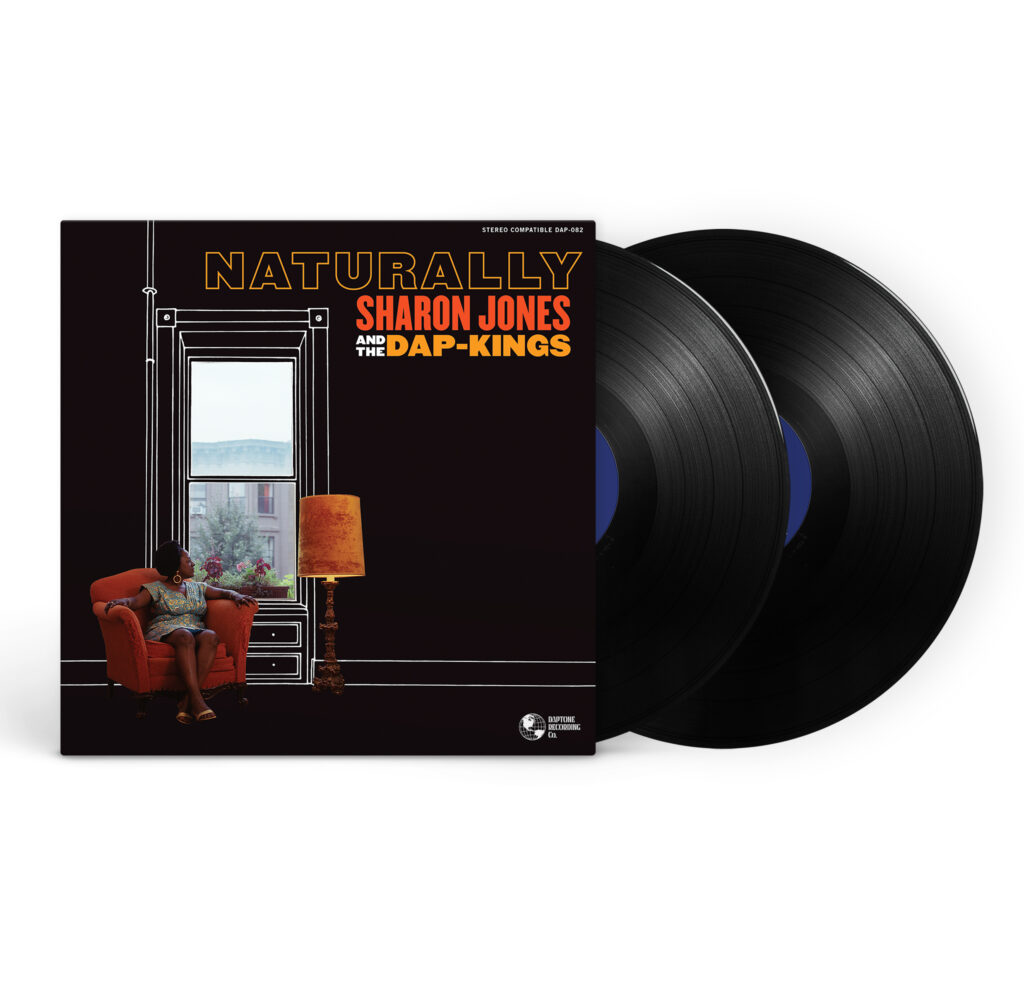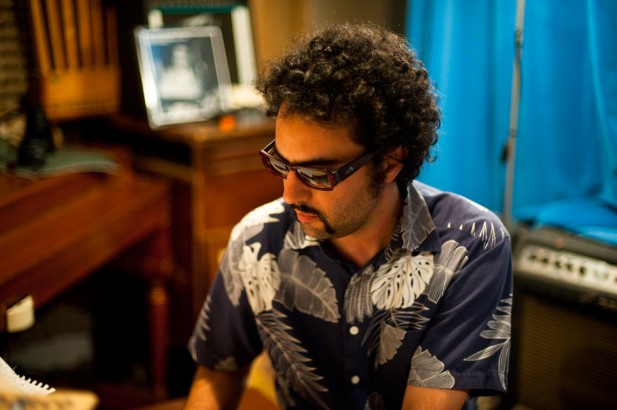Daptone Records holds a fairly unique position in the music industry. In the early 2000s soul and funk musicians Gabe Roth and Neal Sugarman bought a rundown three story building in Bushwick, then a working class neighborhood in Brooklyn. They turned it into the headquarters of their fledging new label Daptone Records, modeled after indie soul labels of the 60s and 70s. They cobbled together an all-analog recording studio with obsolete equipment, and used the top floors as office space and storage for a steady stream of 45s released by the label. Daptone gained notoriety in the music industry when producer Mark Ronson hired the studio and its house band the Dap-Kings to record Amy Winehouse’s hit album ‘Back to Black’ in 2006. But it was the album ‘Naturally’, recorded with the Dap-kings backing up soul singer Sharon Jones in 2005 that first put Daptone on the map. Sharon Jones passed away from pancreatic cancer in 2016.
The label is still going strong, with an impressive roster of artists and releases by bands like the Altons and Thee Sacred Souls. For the 20th anniversary re-release of ‘Naturally’, we had the opportunity to conduct a zoom interview with Gabe Roth from his home in Riverside, California.
Tell us about the album ‘Naturally’.
It was a really big record for Sharon, for me, for Daptone, for the whole scene. We had a real underground scene going in Brooklyn for years. A real family of musicians. We were playing a lot of house parties and lofts and stuff. We were doing a little bit of touring, had some success in England, but with ‘Naturally’ it really came up a step. That record was really well received and we started selling a lot more records…the whole company became a legitimate thing, we started playing bigger places, we started playing TV shows- which still mattered at that time. We started playing festivals and touring all over the world. For a lot of of people it was not only a seminal record, but it has a lot of the songs that people associate with that time and with Sharon.

To what do you attribute the success?
I think there were a few things. The first Dap-kings record was coming out of the ashes of my first label, Desco Records. I’d written and arranged a bunch of songs for Sharon, I grabbed the best musicians from all these different bands. Neal Sugarman from Sugarmen 3, Homer Steinweiss from the Mighty Imperials, Binky and Fernando from the Soul Serenaders, that used to back Sharon… We did a session, that first record was kind of the beginning. We started touring, we went to Barcelona and played a residency for a month and it really started to gel. The musicianship and the sound of that band developed. ‘Naturally’ is the first time you really see that band firing on all cylinders. The songs, the arrangements, but also the rhythm. It was the first Daptone record we recorded in our new studio in Bushwick.
At the same time, some of it is just luck. It’s just what the world is feeling at a certain moment. It seemed to really connect with people. The live shows really started becoming an event, the energy and the rhythm and just Sharon’s presence, we kind of hit a groove you know? We started winning over audiences and there was a lot of word of mouth. We never had a radio hit or anything. Just a lot of people coming to shows and sweating and laughing and crying and singing and having a good time and then telling their cousin, their friend, their mothers and daughters and just bringing out more people, so it was a time of very organic growth for us. Also, at the time it was a breath of fresh air because particularly R’n’B, but music in general, had become so programmed and computerized that it was really something different to hear a band that was that real and raw and live, the way the musicians were playing together, I think people were really excited about it. A lot of things came together.
The way Daptone did everything yourselves, everything under one roof, do you see that as a continuation of the DIY ethos of punk rock?
That’s a good way to put it. Though musically we weren’t punk rock , philosophically we were very punk rock. We were fiercely independent, very skeptical of the industry, the major labels and distributors, the mechanisms used to push music down people’s throats and the way it was being made. We were very intolerant of any kind of BS on any level, in the studio, the marketing or the business. We were very intent on being independent, being ethical, being true first to the music and ourselves and also to our fans, that was an ethos that to this day goes from the top to the bottom. Anybody on the road, in the studio, in the offices, anybody involved with Daptone knows that that’s paramount. We try to keep things real and straight and honest. In that way it was and continues to be very punk rock.
As we’ve gotten bigger and more successful, we’ve been very careful to make sure that we don’t get co-opted by the winds of the industry, all the pressures and temptations that start coming at you as you start doing well. Make sure that the music is first and foremost never really compromised. We are always checking each other to make sure that we’re being true to the music and ourselves and just make music that we love. We know that’s the most respectful thing we can do for our fans. With the Dap-kings and Sharon that stuff was a very big part of the story since the beginning.
The stuff that inspired you guys was basically indie soul music of the 60s and 70s.
All that stuff was very local and that’s why all those 45s ended up being so rare. You know you have a band, you go to a little studio, pay them fifty bucks and make your record, you bring it to the local radio station. I don’t think that was a choice, those were just the options they had. Some stuff would get picked up by companies like Atlantic and Motown, but in general it was a very different model. People compare Daptone to Motown, buy they fail to realize Motown was huge! They were selling millions and millions of records. I mean they were a factory. Our situation was always very different. We’re underground compared to Motown or even Stax.
But your point is correct in that we’re inspired by a lot of music that was independent. A lot of me doesn’t have anything to do with music but a philosophy in life that, you know… I’m not working for the man! I grew up kind of rebellious, I was raised by some agitators so I have that in my blood to start with. I never wanted to be a record company owner or a record producer. It feels a little bit put on to even say these things out loud. I was trying to be a math teacher. I was just making records for fun and I think ironically, because I didn’t have those ambitions to be successful or in this industry, it protected me from a lot of the pressure. When a distributor comes to you and says you have to do this and that if you want us to sell your records, I was free to just say…nah, I’m not doing that, because I didn’t care! That wasn’t my plan. My partner Neal Sugarman was on board right from the beginning. He just loves the idea of having a family of musicians trying to achieve a common goal, working together to make a sound. If you keep that upfront the rest of it is a lot simpler.
Inevitably I have to ask about Amy Winehouse. Her hit album “Back to Black” was recorded at Daptone, with the Dap-Kings backing her up.What was that like?
Sure. You’ll get different answers from different guys in the band about that but within the industry, that record gave Daptone and particularly the Dap-kings, a lot of clout. We got called for a lot of pop sessions where we got hired as musicians, arrangers, producers or engineers. Within the industry that opened doors for us. But as for the fans, it’s kind of hard to say. I think a lot of people from the outside looked at that as some kind of turning point for us, like working with her let everybody know who Sharon was but I really don’t remember it feeling that way. People would come up to us after a show and I always would say, how’d you hear about the band? And most of the time people would say, oh yeah, my friend turned me onto you guys. If it was some kind of marketing thing it was usually like they heard us on NPR Fresh Air or something. In the industry, David Letterman, or the Bumbershoot Festival, or definitely the Amy Winehouse thing, are feathers in your cap that make people say, ok, that was the thing that got you to another level. But it felt a lot more organic than that. We’d go to a town and people loved the show, and next time we went they brought their friends.
The Amy Winehouse thing, she was real cool and easy to work with and uh, it was mellow. I worked with her for a handful of days. We tracked some stuff for her record. I didn’t play bass on that record, I was engineering. I subbed in (substituted for the bass player) and did a couple of shows and maybe a small tour with her. She was always cool, she was real nice and mellow, but there was something anti-climactic about it. You’d play a show (with Amy Winehouse ) and it was over, but with Sharon, we were sweating through our clothes, stomping! Musically you’d get so high! It was just not the same energy. Amy’s obviously a huge star and I think she’s going to be influential for decades but as far as being on stage with somebody, just feeling the energy… Amy was a little girl, man. Sharon was a force of nature! It’s a different order of magnitude as far as energy, it’s just a different thing. I’m glad we did it, but you know it was a little thing that we did at the time… that ‘Back to Black ‘ record went on to be obviously a real big record and people know it and…it was a cool thing. There was also a lot made out of Sharon being jealous or something which I don’t remember her ever being. She always seemed happy for us. She was also doing a lot of stuff herself, singing in musicals with Lou Reed, she was in movies with Denzel Washington … so she was really supportive of us.
Daptone is famous for its unique sound, using tape machines and all analog gear. You started by collecting obsolete gear for the original Daptone studio in an old house in Bushwick, Brooklyn. Could you tell us a little more about that?
My current studio in Riverside is way better than that room in Bushwick. People get fetishist about stuff. That was not a magic room! That was not even a good sounding room. We didn’t have amazing equipment or anything, we just had really good musicians and, you know, you turn the knobs the right way. I remember one time Mark Ronson (producer of Amy Winehouse and others) was in there recording something and he started talking about how the linoleum on the floor was “magic”, because the drums sounded so good. I was like, are you fucking kidding me? You got a one in a million drummer there, we’re sitting here slaving away trying to tune everything and move every microphone one inch at a time…we’re putting all this work into trying to make it sound good, and you’re going to sit there and tell me the linoleum is magic? People are always looking to spaces and equipment to …oh its magic, that place is magic. I don’t believe in magic man, I believe in people. You could use Pro Tools or garageband (recording software) and a Mackie mixer and some SM57s (Shure SM57 microphones) and you could record in a dentist office …give me the Dap-kings and let me turn some knobs man, it’s going to sound like fucking Daptone. We didn’t have anything magic. There’s no magic equipment, that room is not magic, if anything, that room was very hard. It wasn’t a big room, there was a lot of buildup of frequencies, a lot of bleed…the studio that I built out here in Riverside is much easier to record in. I think the room is nicer sounding too.
Here’s one for you. I went to Royal Studio in Memphis, the High Sound, where Willie Mitchell recorded, all the Al Green records, and a bunch of stuff that came out on ( 60s independent soul ) labels like Backbeat and Twilight. Willie Mitchell is one of my favorite producers. One time years ago, we were on tour and we stopped at Royal Studios. It was still kind of set up the same way as it had been. I went in there and Willie Mitchell was there. And I was kind of star struck because there’s not a lot of people that can do what he did, which is really have the sound from top to bottom, engineering, arranging…so I started asking him all these questions, what microphone did you put on this, what tape machine did you use…He stopped me and he said, the only equipment you need is this –touches heart– and these- touches ears. That’s all that matters. And it really stuck with me. ‘Cause even at the time we didn’t have a lot of vintage equipment or fancy stuff. People get very fetishist about that. Honestly, the musicians are the important thing. What people are playing. You can put any microphone you want in front of them and then you just have to trust your ears and not try to follow what you think somebody else did. The Beatles used this microphone, at Motown they did this, well good luck, it’s not going to sound like that. If you got John Lennon or Marvin Gaye, you put them on a different microphone, it honestly doesn’t fucking matter. People want an excuse to make it not about working hard. They want it to be about something you can buy or something… at the end it’s just about working hard, using your ears and taking your time and keep working on it until its right.
Do you think you’ve changed the way recording is approached? I was thinking about a band like Silk Sonic who made a hit album with all analog gear.
The Bruno Mars thing? I don’t know man…that’s a question for them. People ask me what kind of influence we’ve had on pop music and stuff. It’s flattering but our place in the industry has never been important to us. I’ve always felt like we were able to succeed in spite of that whole industry. The things that are winning Grammys, that are put on the radio, that have money behind them and are being marketed well…we didn’t succeed within that and we definitely never got support from that. Talking about Silk Sonic, Bruno Mars did come to the studio a bunch of times and talked to me about, how do we get sound and stuff. I know for a fact there’s guys like that that are definitely checking us out real heavy. I think within the industry there’s a lot more of that than people realize. But I wouldn’t take credit for any of that. Let them do what they’re doing and we do what we’re doing.
Have you heard of the Music Venue Trust in the UK? They’re an organization advocating for smaller music venues, which are struggling everywhere, including here in New Orleans. Is that struggle something you’re aware of?
Yes! I’m very aware of it. I haven’t heard of the Music Venue Trust, but I started becoming aware when we were on tour because years ago there was a point where we said, we’re not going to play any more Live Nation venues. And it quickly became untenable. Because Live Nation went into so many ( US ) cities and bought or closed down every possible hole in the wall that you could play. They own or control everywhere. And they own Ticketmaster…that’s as close as you can come to the mafia. I think Ticketmaster is the worst monopoly that’s been around in a hundred years. A few years ago I put together a Penrose showcase, which is an imprint of Daptone, we had Thee Sacred Souls, The Altons, Los Yesterdays, it was a big showcase at a big theater out here. And I was trying so hard to keep it independent, and I really couldn’t. There was no venue big enough that wasn’t controlled by Live Nation. And there was no tenable way to ticket it without Ticketmaster. And at the end of it I was doing the settlement and I saw Ticketmaster make 60,000 dollars in two days, and they did nothing! They didn’t even do any marketing. All they did was inflate ticket prices. So I’m very aware of the monopoly and the problems small venues are having. Big venues as well, really. It used to be, depending on the size of your band, you could find an independent room to play. Now you basically have to book a bingo hall, because other than that it’s all controlled by Live Nation. We have a couple of big beautiful venues here in Riverside that I think are owned by the city, but Live Nation basically controls them. They do all the booking, they do all the production, you can’t get around them. It’s unbelievable how greedy these companies are.
How do you see the future of the music industry, especially with streaming?
That’s a good question. Optimistically, what I hope is that kids start playing music together more. There’s so much music being made by people alone in front of computers. I’m not that much of a Luddite but I do think that there aren’t enough kids enjoying playing music with each other. The thing I always loved about music was being in a room with a bunch of friends and reacting to each other and feeling rhythm together, feeling harmony together and the co-operative nature of music and all those things that happen live with other people .That doesn’t happen when you record drums alone, then email it to somebody and they overdub bass and so on, or even if you’re doing it by yourself…I think it’s cool that it’s so cheap to produce music now , you don’t need a studio or a record deal, but I’m hoping that the future of music is people discovering real music and discovering real instruments …I think in New Orleans that is still a real tradition, it’s not as lost as it is in other places.
True…( I live and play music in New Orleans-ED )
The future of how people consume music, I’m not qualified to answer that. Obviously everything, not just music but all intellectual property, has gone from buying to renting. You just pay for access. Even transportation, you just have an account. Everything is an account. If I was to guess I’d say it will probably continue that way. Which I don’t think is inherently bad… But- we opened a record store here in my hometown, and vinyl sales have been going up and up and up! A few years ago it was weird old nerdy dudes like me and collectors and people clinging to the past buying vinyl, but now in our record store it’s a lot of kids, high school kids, college kids, rediscovering a different relationship with music. Over the last years music just became cheaper and smaller and faster, you can have access to every song you could possibly imagine, on your watch or your phone, at a moment’s notice. The quality is worse, you’re not dealing with artwork, or hearing a whole album, it’s a less intimate thing. But the thing about music is it doesn’t really help to have more of it. You don’t need unlimited access, you just need meaningful moments… For those of us of the generation where you would go on a road trip and you have a couple of tapes that you listen to over and over… sometimes that’s better than just having a phone and being able to hear anything you want. It’s nice to engage with an album and an artist, to take your time and listen. That’s something that this generation is discovering. For them it’s something brand new, because they’re used to music being everywhere. To walk in a record store and pick up an album and see somebody’s face and being able to drop the needle and listen, they’re very excited by that! So it’s pretty cool, man. I’m optimistic for the future of music.
What’s next for Daptone?
Oh, we’re crushing it right now, man, we have a lot of good stuff in the pipe. This year we just dropped an Altons record, we have the fourth Antibalas record, there’s a third record by Cochemia that’s coming out this year, I’m working on a record with the Womack Sisters that’s going to be really good… in the next couple of years we have a lot of really exciting stuff we’re working on. Were very happy right now with the roster of artists we’re working with.
The Dap-kings don’t really exist anymore, do they?
(Laughs) I guess that’s an existential question…we haven’t been playing gigs or sessions as the Dap-kings in a while but a lot of the musicians are still around, doing sessions together, and we’re all still in touch, and in different capacities we still work together. That family of musicians still remains the core of the energy for Daptone. A lot of things have spun off out of that band, studios, labels, other bands. I’m hoping at some point to reunite the band one more time and back somebody up for a record or a show or something, it’d be fun. Never say never!
Thanks for the interview and for your time!
Thank you, I appreciate you doing this! We’re trying to keep Sharon from getting lost in history. She was a force of nature and I feel like I owe it to her to do what I can to remind people about her.
The 20th anniversary reissue of “Naturally’, by Sharon Jones and the Dap-Kings arrives May 2nd, in time for the late Jones’ own birthday on May 4th. A new vinyl pressing will consist of a remastered 2xLP version that includes instrumentals for all tracks. In addition to the standard black LP, the Indie retail exclusive variant includes opaque orange color vinyl and the Daptone shop exclusive variant includes clear vinyl with orange splatter.




